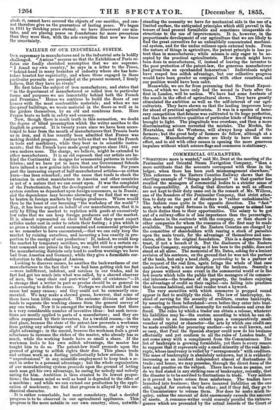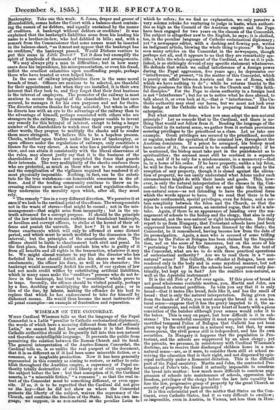COMMERCIAL GUARANTEES.
"SOMETHING more is wanted," said Mr. Dent at the meeting of the Peninsular and Oriental Steam Navigation Company-, "than a mere certificate that the accounts correspond with these in the ledger, when there has been such mismanagement elsewhere." This reference to the Eastern Counties Railway shows that the startling example of "things made pleasant" in that quarter has recalled the managers of commercial bodies to a stricter sense of their responsibility. A feeling that directors as well as officers are not kept to their duty came out in the remark of Mr. Willcox, one of the founders of the Peninsular Company, that strict atten- tion to duty on the part of directors is rather unfashionable." The fashion runs quite in the opposite direction. The "last" men, who make rapid fortunes in the world, appear to attend less to their duties than to their opportunities. The salary to be got out of a railway-office is of less importance than the percentages, than shares in the contracts with the company, or than shares in other companies for whom the resources of the first may be made available. The managers of the Eastern Counties are charged by the committee of shareholders with rearing a stock of parasites upon the main trunk, for the advantage of themselves and asso- ciates, alien to the original foundation. This is a departure from trust, if not a breach of it. But the disclosure of the Eastern Counties Company, surprising as it has been to the public, does not stand at all alone. The memorial of Mr. Bates, asking for a lenient revision of his sentence, on the ground that he was not the partner of the bank, but only a head.clerk, pretending to be a partner at the request of the real firm, again brings the whole of that case under review, with a new deception by the bankers. Scarcely a day passes without some event in the commercial world or in the law courts which tells the public that the managers of its commer- cial interests—the trustees of its Rroperty, the traders enjoying the advantage of credit as their capital—are falling into praetioes that become habitual, and that render trust a byword.
The very securities with which commerce is propped round appear in fact to multiply the risks. The law of bankruptcy, in- stead of serving for the security of creditors, creates bankrupts, by assuring to them beforehand—even before they enter into busi- ness—the opportunities of immunity for recklessness and even for fraud. The rules by which a trader can obtain a release, whatever his liabilities may be—the custom. according to which he can ob- tain credit to an immense extent upon a comparatively small voucher of capital or character—the arts by which one credit can be made available for procuring another—are so well known, and so easy, that Paul the Spanish sharper could now do his business effectually and yet conform to all the rules of London trade, if not come away with a compliment from the Commissioner. The list of bankrupts is growing formidable, yet there is every reason to suppose that it represents only a small minority of the real bank- rupts, whose insolvency is veiled by " arrangements " with creditors. The mass of bankruptcy is absolutely unknown, but it is evidently increasing as an incident independent almost of fluctuations in trade ; and hence, we may presume, through the direct foroe of the laws and practice on the subject. There have been no panics, nor do we find stated in any striking ease of bankruptcy, recently, that the disaster is to be ascribed to fluctuations in trade. Very seldom is it proved to have arisen from misfortune. The traders have launched into business ; they have incurred liabilities on the one side, angled for custom on the other ; and if they fail, they go to the Commissioner to release them. Nor does he make much in- quiry, unless the amount of debt enormously exceeds the amount of assets. A romance-writer could scarcely parallel the 'extrava- gances which are presented by the actual records of the Court of
Bankruptcy. Take one this week. S. Jonas, draper and grocer of Houndsditeh, comes before the Court with a balance-sheet contain- ing the names of no debtors, and equally unstained by the names of creditors. A bankrupt without debtors or creditors! It was explained that the 4anirupt's liabilities arose from his lending his name to a brother-in-law, who had dabbled in bills; and, with a remark from the Commissioner that some names must be inserted in the balance-sheet, "as it must not appear that the bankrupt has no creditors," the bankrupt passed. Would Dickens venture to put this scene in Little Dorrit? Yet it does but exemplify the spirit of hundreds of thousands of transactions and arrangements. We may always pity a man in difficulties ; but in how many cases does his imprudence, his misrepresentation, or even his fraud, inflict the cruellest calamities upon unoffending people, perhaps those who have trusted or even helped him.
In the ease of railway irregularities there is the same moral breach of trust. Officers are anxious to be selected, are thankful for their appointment ; but when they are installed, it is their own interest that they look to, and they forget that their first business is the interest of employers. The promoter of the railway is most anxious to secure the capital of the shareholders ; but that once secured, he manages it for his own purposes and not for theirs. The director returns thanks for being selected; but when in office he directs less with an eye to the advantage of the railway than to the advantage of himself, perhaps associated with others who are strangers to the railway. The committee appear unable to invent any remedy for this betrayal of interest, except to bring a larger number of the shareholders to watch over their own property ; in other words they propose to multiply the checks and to render them more Aringent. We believe this to be a hopeless process. Checks, whether upon traders under the laws of bankruptcy, or upon officers under the regulations of railways, only constitute a licence for the very clever. A man who has a particular object in view, and can attain it consistently with the literal observance of the rules, may almost justly say that it is the business of the shareholders if they have not completed the fence that guards their interests. The very multiplicity of the checks confuses those who are protected, as much as those who are to be constrained; and the complication of the vigilance required has rendered it al- most physically impossible. Nothing, in fact, can be the substi- tute for the true watchman—an honourable conscience in the of- ficer. And if the trading community continue to throw an in- creasing reliance upon mere legal restraint and regulation-checks, they undermine the morality upon which, after all, they must rely.
"The remedy" lies in every different direction. We perceive it at once if we look to the cardinal point of the offence. Thewrong consists not in the waste of stores—that might be casual ; not in the mis- management—that might arise from incapacity ; but in the un- truth advanced for a corrupt purpose. It should be the principle of the law intended to restrain reckless and fraudulent bankrupts, or heedless and corrupt officers, to strike at the kernel of their of- fence and punish the untruth. But how ? It is not for us to frame enactments which will only be affirmed at some distant period, and which must be much modified by the discussion in the interval; but the principles of the enactments are clear. The offence should be liable to chastisement both civil and penal. In the first place, the fraud should exclude him who is guilty of it from all benefits and all rights in the transaction, whatever it may be. We might almost venture to say that the director who has forfeited his trust should forfeit also his shares as well as his emoluments; the officer his dues, as well as his character ; the bankrupt would necessarily forfeit his credit, if our system of law had not made credit wither by substituting artificial liabilities, which in many cases make the " creditors " persons who do not be- lieve in the bankrupt, but trust to "securities" which prove to be traps. Secondly, the offence should be visited penally, perhaps by a fine, doubling or multiplying the anticipated gain ; or in lieu of the fine, by labour, making the offender do his best to replace that which he has endeavoured to take for himself by dishonest means. He would thus become the most instructive of all penal examples—an example of frustration and reparation.



































 Previous page
Previous page